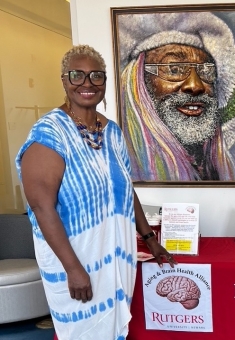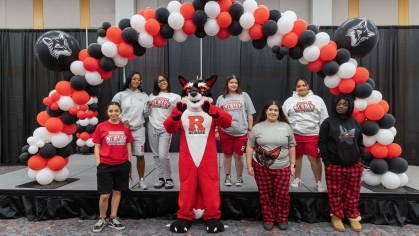Working with Public Housing Residents to Raise Awareness of Dementia Risks

The East Orange seniors were excited that Glenda Wright had come back to their community room to talk about brain health. Wright returns regularly to share the latest scientific news on how a healthy lifestyle can reduce their chances of dementia, a symptom of Alzheimer’s disease that Black people get at twice the rate as the overall population.
Wright’s life’s work has been advocating for the interests of residents of public and other federally-subsidized housing, an arena where she spent nearly 40 years fighting for families and residents in low-income housing.
Recently, she was honored by The East Orange Senior Volunteer during a Women’s History Month celebration. Surrounded by family and friends, the Essex County Board of County Commissioners and the New Jersey Senate also praised Wright in glowing resolutions emphasizing her staunch, fearless advocacy.
For most of Wright’s career, up through 2016, she served as executive director of the New Jersey Association of Public and Subsidized Housing, a Newark based nonprofit that focussed on tenant support. But now in the community room where residents once listened to her talk about rent, Wright educates seniors about Alzheimer’s and dementia, sharing with them ways they can reduce their risk.
Wright landed in this space after meeting Dr. Mark A. Gluck, director of the Aging & Brain Health Alliance at Rutgers-Newark, where he also is a professor of Neuroscience and Public Health.
Gluck explained how the Black community was impacted and often underrepresented in Alzheimer’s research. African Americans are more than twice as likely to develop the disease, yet there are few studies focusing exclusively on them.
His Pathways to Healthy Aging study examines the interaction between genetics, environment, and lifestyle in the development of Alzheimer's Disease among African Americans. Since 2016, it has followed the health of more than 500 Newark-area residents ages 60 and older who were cognitively healthy when they joined the study.
The program has gained national recognition, making it the largest study of aging and Alzheimer’s in the Black community in the country.
Wright wanted to be a part of this initiative, a research effort funded by the National Institute on Aging, part of the National Institutes of Health (NIH), that also provides health advice and outreach to seniors.
Wright, whose sister has Alzheimer’s, joined the Rutgers’ alliance and quickly became a compelling community brain health educator, delivering heartfelt presentations. Seniors hang on every word, clamoring around her around afterward to ask questions.
Since 2016, Gluck said that these brain health education programs run by Wright and other Rutgers Community Brain Health Educators Rutgers reach about 1,200 people per year, some of whom go on to enroll in the research studies that Gluck directs.
“Almost half of everybody in our program lives in federally subsidized low-income housing and that’s really important because that’s mostly due to Glenda and her efforts and her relationships,’’ Gluck said. “Her passion for the issue of Alzheimer’s in the Black community is deeply profound and personal. This is obviously not just a job for her.’’
In her role as housing advocate, residents relied on Wright to explain tenant’s rights and policy or decipher complicated federal regulations from the U.S. Department of Housing and Urban Development.
“I was a die-hard housing advocate for the underdog,’’ Wright said. “I let them know that you have a voice, that you have to speak up.’’
As an outreach worker for the Alliance, Wright has continued to form bonds and encourage seniors to share their stories.
“She makes it fun and they understand what she is trying to convey to them,” said Patricia Cabello, a Newark Housing Authority social worker. “They always ask when she is coming back.’’
Catherine Willis, a current study participant and former Director of Senior Services for East Orange, said Wright is able explain the difference between Alzheimer’s and dementia and help seniors take control of their health.
“She loves people,’’ said Willis, 85, of East Orange. “She loves to share and takes as many questions they have.’’
Wright’s brain health gospel is infectious, and her senior audience listens.
“My reward is empowering seniors,’’ Wright said. “Information is power. It can change their life.”

